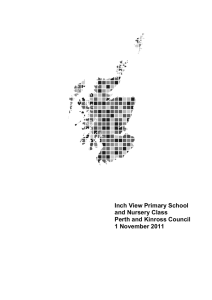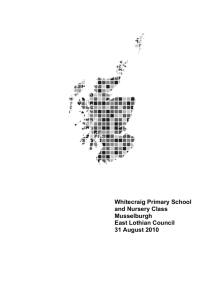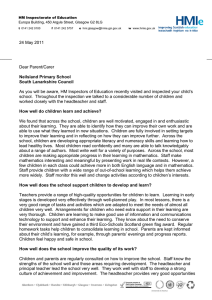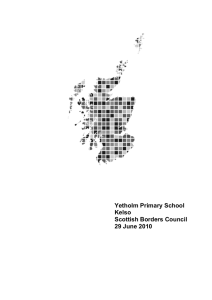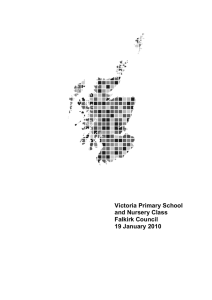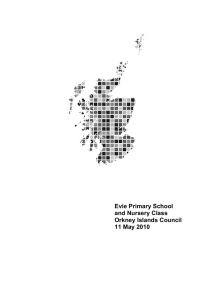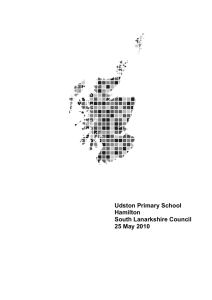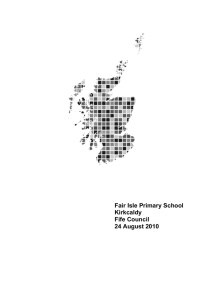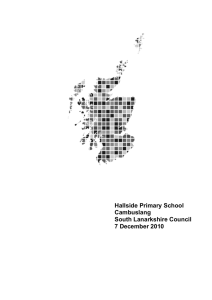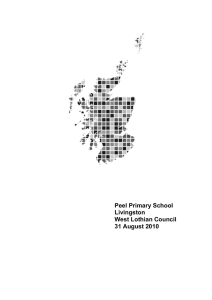Bonhill Primary School West Dunbartonshire Council
advertisement
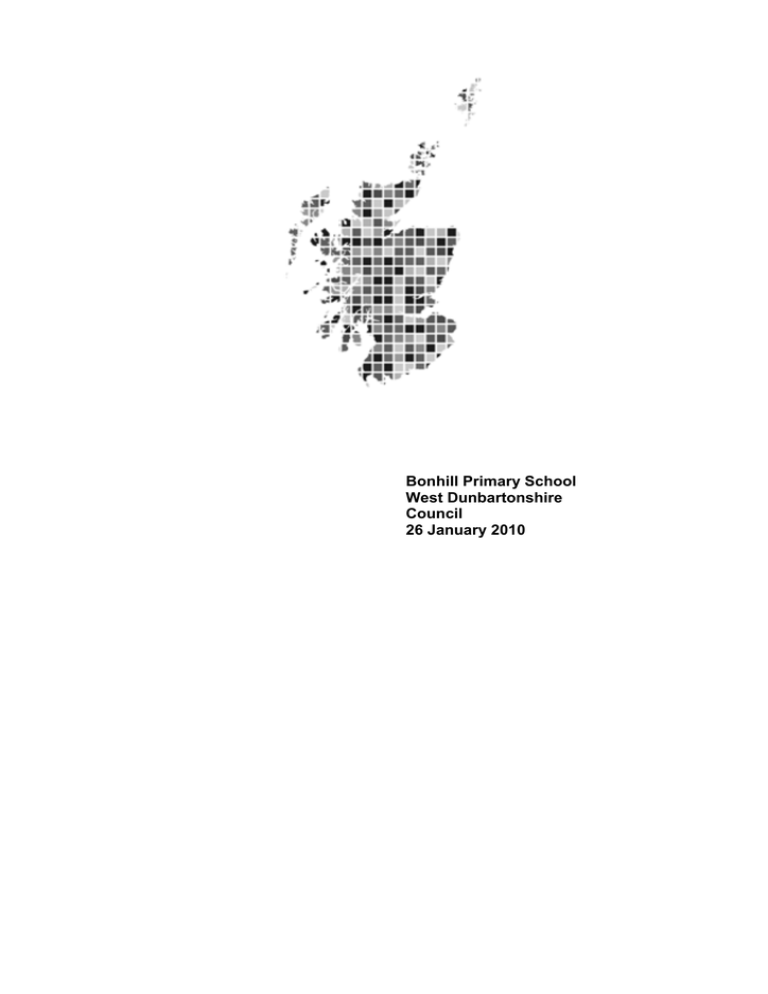
Bonhill Primary School West Dunbartonshire Council 26 January 2010 HM Inspectorate of Education (HMIE) inspects schools in order to let parents1, children and the local community know whether their school2 provides a good education. Inspectors also discuss with school staff how they can improve the quality of education. At the beginning of the inspection, we ask the headteacher and staff about the strengths of the school, what needs to improve, and how they know. We use the information they give us to help us plan what we are going to look at. During the inspection, we go into classes and join other activities in which children are involved. We also gather the views of children, parents, staff and members of the local community. We find their views very helpful and use them together with the other information we have collected to arrive at our view of the quality of education. This report tells you what we found during the inspection and the quality of education in the school. We describe how well children are doing, how good the school is at helping them to learn and how well it cares for them. We comment on how well staff, parents and children work together and how they go about improving the school. We also comment on how well the school works with other groups in the community, including services which support children. Finally, we focus on how well the school is led and how staff help the school achieve its aims. If you would like to learn more about our inspection of the school, please visit www.hmie.gov.uk. Here you can find analyses of questionnaire returns from children, parents and staff. We will not provide questionnaire analyses where the numbers of returns are so small that they could identify individuals. Where applicable, you will also be able to find descriptions of good practice in the school. 1 Throughout this report, the term ‘parents’ should be taken to include foster carers, residential care staff and carers who are relatives or friends. 2 The term ‘school’ includes the nursery class or classes where appropriate. Contents 1. The school 2. Particular strengths of the school 3. How well do children learn and achieve? 4. How well do staff work with others to support children’s learning? 5. Are staff and children actively involved in improving their school community? 6. Does the school have high expectations of all children? 7. Does the school have a clear sense of direction? 8. What happens next? 1. The school Bonhill Primary School is a non-denominational school. It serves the area of Bonhill in West Dunbartonshire. The roll was 170 when the inspection was carried out in November 2009. Children’s attendance was in line with the national average in 2007/2008. The headteacher has been in post since August 2009. 1 2. Particular strengths of the school • The positive learning environment. • Children’s attitudes and enthusiasm towards their learning and wider achievements. • The positive approach of staff to embracing change which is improving learning and teaching. • The headteacher’s leadership. 3. How well do children learn and achieve? Learning and achievement Children are well-motivated and enthusiastic learners. In almost all classes, they work well together in pairs and small groups. They are becoming more independent and actively involved in their learning. However, they need more help from staff to take responsibility for their own learning. Most staff offer clear feedback to help children’s understanding of what they need to do to improve. Children use information and communications technology (ICT) well, for example, to research topics and to support their learning in mathematics. They extend their interests and skills through involvement in after-school clubs, lunchtime activities, choir and instrumental tuition. They are learning to be responsible by taking part in charity events and through their work on the eco committee and pupil council. A wide range of outings, events and visits have extended children’s interests and understanding of the world. Children at P6/7 developed their teamwork skills through the challenging activities at the recent residential experience at Gartmore Outdoor Centre. 2 Overall, children are making good progress in English language and mathematics. Standards of attainment in English language and mathematics have varied over the last three years. Most children attain appropriate national levels in listening, talking, reading, and mathematics and the majority do so in writing. A few children achieve these levels earlier than might normally be expected. Most children listen effectively for information and take part confidently in class talks and discussions. Most children enjoy reading and read with understanding. The majority of children write well for different purposes. In mathematics, children have a good understanding of using weight and measurement and can apply this effectively in practical situations. Most children are accurate in their mental and written calculations. At P6 and P7 children are confident in using a range of problem-solving strategies and can relate these to everyday situations. Curriculum and meeting learning needs The school curriculum is broad and children experience a good range of activities. Staff are at the early stages of developing the curriculum in line with Curriculum for Excellence. They are now planning more effective links between literacy and numeracy across other areas of the curriculum. Recent project work, for example, on the Victorians and Hollywood is helping to make learning more interesting and provides opportunities for children to link aspects of their writing experiences across the curriculum. A wide range of activities in art and design help children develop their imaginative and creative skills. Children are benefiting from improved experiences in music and sing enthusiastically at school assemblies. The school provides children with two hours of good quality physical education each week. Across the school, staff are improving their approaches to meeting the needs of all children. In most classes, tasks and activities are appropriate and help to motivate children. However, for a few children, tasks are often too easy. A few children could make greater progress in their learning with the use of more challenging tasks. The needs of children requiring additional support are being met appropriately. 3 Recent changes to recording the progress of children with additional support needs are helping children achieve their learning targets. Regular reviews with appropriate agencies, parents and children are assisting staff in identifying the next steps in children’s learning. The school encourages children to set their own learning targets with their parents and teachers. Across the school, teachers and learning assistants interact very positively with children and provide individual encouragement and well-targeted help. Homework is regular and varied for all children. Improved teaching approaches have helped staff to ensure that children are making better progress and achieve higher standards. 4. How well do staff work with others to support children’s learning? In order to support children’s learning, staff have recently improved their contact with the speech and language therapist and the educational psychologist. Parents support the school well and appreciate the changes made by the headteacher. Communication has improved through more detailed newsletters, open afternoons and parents’ evenings. The headteacher has improved the school’s arrangements for responding to complaints from parents and children. The Parent Council provides good support by encouraging parents to be more active in their child’s learning and helping in the school. All parents are consulted about sensitive health issues. The school has productive links with the local community and the school chaplain. There are helpful transition arrangements to support children in transferring from nursery to P1 and from P7 to Vale of Leven High School. 5. Are staff and children actively involved in improving their school community? Children are keen to be involved in improving the school, for example, by helping the school gain their Health Promoting Schools award. The 4 eco committee are preparing a detailed travel plan for their move to the new school by using their ICT skills to research road safety. The pupil council applied for and were awarded a grant to provide playground equipment and after-school activity clubs. The headteacher’s strong focus on self-evaluation ensures all staff are involved in improving experiences for children. She visits classrooms regularly which support and challenge staff. Her feedback to teachers results in children making better progress in learning. Staff are reflective about their practice and have welcomed the recent changes to learning and teaching. These changes are beginning to lead to improvements, for example in attainment. They are enthusiastic about taking forward priorities in the revised improvement plan. 6. Does the school have high expectations of all children? There is a positive ethos throughout the school. Children are proud of their school, and are very polite. They speak confidently about how members of the pupil council and eco committee are chosen and feel this is a fair system. Children feel safe and well looked after and know who to go to if they are worried or upset. Staff are knowledgeable about child protection procedures. Older children look after and support their “buddy” in P1 particularly well. All children enjoy being at school but a few find the work too easy. Staff set high expectations of behaviour. They are raising their expectations of children’s learning, particularly in English language and mathematics. Children’s achievements are celebrated regularly at assemblies and on wall displays. All staff actively encourage good attendance and take appropriate action if children are absent from school without explanation. Children have good opportunities to participate in religious observance through regular assemblies. They are learning respect and tolerance for each other through a recent anti–sectarian project with other local schools. 5 7. Does the school have a clear sense of direction? The recently appointed headteacher has provided her staff with a clear sense of direction. She has accurately identified areas for improvement. She has given a strong lead to staff about the need to improve attainment, promote partnerships and develop the curriculum. The headteacher is highly respected by children, parents and staff. She is supported well by the acting depute headteacher. The recent focus on self-evaluation is helping staff to improve their teaching. The headteacher is well placed to work with children, staff and parents to develop the school’s vision and values. The school is in a strong position to continue to improve. 8. What happens next? We are confident that the school will be able to make the necessary improvements in light of the inspection findings. As a result, we will make no more visits in connection with this inspection. The school and the education authority will inform parents about the school’s progress in improving the quality of education. 6 We have agreed the following areas for improvement with the school and education authority. • Continue to raise attainment in English language and mathematics. • Build on the existing good practice in learning and teaching to ensure that tasks provide all children with a suitable level of challenge. • The headteacher should work with children, staff and parents to review the school’s vision, values and aims in preparation for moving to their new school in 2010. 7 Quality indicators help schools and nursery classes, education authorities and inspectors to judge what is good and what needs to be improved in the work of a school and a nursery class. You can find these quality indicators in the HMIE publications How good is our school? and The Child at the Centre. Following the inspection of each school, the Scottish Government gathers evaluations of three important quality indicators to keep track of how well all Scottish schools and nursery classes are doing. Here are the evaluations for Bonhill Primary School. Improvements in performance Learners’ experiences Meeting learning needs good good satisfactory We also evaluated the following aspects of the work of the school. The curriculum Improvement through self-evaluation HM Inspector: Elizabeth Paterson 26 January 2010 8 good good When we write reports, we use the following word scale so that our readers can see clearly what our judgments mean. excellent very good good means means means satisfactory weak unsatisfactory means means means outstanding, sector leading major strengths important strengths with some areas for improvement strengths just outweigh weaknesses important weaknesses major weaknesses If you would like to find out more about our inspections or get an electronic copy of this report, please go to www.hmie.gov.uk. Please contact us if you want to know how to get the report in a different format, for example, in a translation, or if you wish to comment about any aspect of our inspections. You can contact us at HMIEenquiries@hmie.gsi.gov.uk or write to us at BMCT, HM Inspectorate of Education, Denholm House, Almondvale Business Park, Almondvale Way, Livingston EH54 6GA. Text phone users can contact us on 01506 600 236. This is a service for deaf users. Please do not use this number for voice calls as the line will not connect you to a member of staff. You can find our complaints procedure on our website www.hmie.gov.uk or alternatively you can contact our Complaints Manager, at the address above or by telephoning 01506 600259. Where the school has a nursery class, you can contact the Complaints Coordinator, Headquarters, Care Commission, Compass House, Riverside Drive, Dundee DD1 4NY, telephone 0845 603 0890. Crown Copyright 2010 HM Inspectorate of Education
